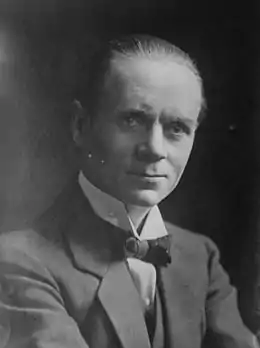Norman Angell
Ralph Norman Angell-Lane, né à Holbeach dans le comté du Lincolnshire en Angleterre le et mort à Croydon dans le Grand Londres le , est un écrivain et homme politique anglais, lauréat du prix Nobel de la paix en 1933.
Norman Angell

Norman Angell
| Membre du 35e Parlement du Royaume-Uni 35e Parlement du Royaume-Uni (d) Bradford North (en) | |
|---|---|
| - |
| Naissance | Mansion House (d) |
|---|---|
| Décès | |
| Nationalité | |
| Formation | |
| Activités |
| Parti politique | |
|---|---|
| Distinctions |
Son essai La Grande Illusion, publié en 1910, rencontre un succès international. Selon lui, croire à une guerre entre grandes puissances est une « grande illusion ». Angell remanie cette analyse, démentie par les faits en 1914-1918, dans une version de son livre parue en 1933, où il pense que déclarer la guerre à un autre pays est contre-productif sur le plan économique.
Œuvres
- Patriotism under Three Flags: A Plea for Rationalism in Politics (1903)
- Europe's Optical Illusion (1909, 126-page pamphlet, given "fuller and more detailed treatment" in The Great Illusion)
- The Great Illusion: A Study of the Relation of Military Power to National Advantage (335 pages in 1910, followed by numerous "revised and enlarged" editions)
- America and the New World State (in U.S., 1912)
- The Foundations of International Policy (1912)
- War and the Workers (1913)
- Peace Treaties and the Balkan War (1913)
- Prussianism and its Destruction (1914)
- America and the New World-State. A Plea for American Leadership in International Organization (1915)
- Problems of the War and Peace: A Handbook for Students (1915)
- The World's Highway (1916)
- The Dangers of Half Preparedness (1916, in U.S.)
- War Aims: The Need for a Parliament of the Allies (1917)
- Why Freedom Matters (1917)
- The Political Conditions of Allied Success: A Protective Union of the Democracies (1918, in U.S.)
- The Treaties and the Economic Chaos (1919)
- The British Revolution and the American Democracy (1919)
- The Fruits of Victory (1921)
- The Press and the Organization of Society (1922)
- If Britain is to Live (1923)
- Foreign Policy and Human Nature (1925)
- Must Britain Travel the Moscow Road? (1926)
- The Public Mind: Its Disorders: Its Exploitation (1927)
- The Money Game: Card Games Illustrating Currency (1928)
- The Story of Money (1929)
- Can Governments Cure Unemployment? (1931, with Harold Wright)
- From Chaos to Control (1932)
- The Unseen Assassins (1932)
- The Great Illusion—1933 (1933)
- The Menace to Our National Defence (1934)
- Preface to Peace: A Guide for the Plain Man (1935)
- The Mystery of Money: An Explanation for Beginners (1936)
- This Have and Have Not Business: Political Fantasy and Economic Fact (1936)
- Raw Materials, Population Pressure and War (1936, in U.S.)
- The Defence of the Empire (1937)
- Peace with the Dictators? (1938)
- Must it be War? (1938)
- The Great Illusion—Now (1939)
- For What do We Fight? (1939)
- You and the Refugee (1939)
- Why Freedom Matters (1940)
- America's Dilemma (1941, in U.S.)
- Let the People Know (1943, in U.S.)
- The Steep Places (1947)
- After All: The Autobiography of Norman Angell (London: Hamish Hamilton, 1951; rpt. New York: Farrar, Straus and Young, 1952). [Out of print.]
- Le "Week-end" (F delta res 716 (01) (30)), Mouvements pacifistes. Brochures, Fonds Prudhommeaux, Jules : Pacifisme. [Brochure numérisée et accessible dans la bibliothèque numérique l'Argonnaute, La contemporaine. Bibliothèque, archives, musée des mondes contemporains
Notes et références
- London Gazette : n° 33675, p. 2, 01-01-1931
Voir aussi
Bibliographie
- (en) J. D. B. Miller, Norman Angell and the Futility of War, Macmillan, 1986.
Liens externes
- (en) Biographie sur le site de la fondation Nobel (le bandeau sur la page comprend plusieurs liens relatifs à la remise du prix, dont un document rédigé par la personne lauréate — le Nobel Lecture — qui détaille ses apports)
- Notices dans des dictionnaires ou encyclopédies généralistes :
- Ressource relative à la vie publique :
- (en) Hansard 1803–2005
Cet article est issu de wikipedia. Text licence: CC BY-SA 4.0, Des conditions supplémentaires peuvent s’appliquer aux fichiers multimédias.